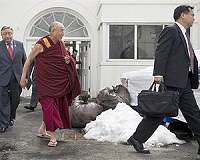| . |  |
. |
Washington (AFP) Feb 20, 2010 In the span of a few weeks, China has angrily denounced the United States twice after President Barack Obama met the Dalai Lama and approved an arms package to Taiwan. But despite the strident words, some US officials, if not yet breathing a sigh of relief, are cautiously optimistic that relations between the Pacific powers will weather a stormy patch. China watchers in the United States say Beijing may have concluded that it overplayed its hand with its recent assertive stance or that its interests are best served by seeking cooperation with Washington. On Friday, China summoned the US ambassador, Jon Huntsman, and warned that Obama had "seriously harmed China-US relations" by meeting with the Dalai Lama, Tibet's spiritual leader who has lived in exile since 1959. Asked to assess the Chinese reaction, a senior US official said on condition of anonymity: "I think there were some decibels. I'm not sure there were teeth." In late January, China announced it was suspending military ties with the United States and punishing US companies involved in a 6.4-billion-dollar weapons sale to Taiwan, which Beijing considers a rebel province. But Chinese authorities allowed the USS Nimitz aircraft carrier to visit Hong Kong on Wednesday, just hours before Obama's meeting with the Dalai Lama. Bonnie Glaser, a China expert at the Center for Strategic and International Studies think-tank in Washington, said Beijing may have realized it cannot stop the US president from meeting with the widely respected Buddhist monk. "In part, they may have recognized that the sort of nationalistic emotional reaction to the arms sales was already getting out of hand and further fanning the flames of nationalism does not serve Chinese interests, particularly with a relationship as important as that with the United States," Glaser said. "This may be wishful thinking, but they may be beginning to see that what many people are seeing as a more assertive posture by China is not necessarily going to produce the outcome they want." Obama returned on the defensive from his first visit to Beijing in November. China gave him no visible achievements -- it did not free jailed dissidents as it has in the past for visiting US leaders and did not broadcast the president's one public forum. In his first year in office, Obama put off major actions opposed by China. He did not meet the Dalai Lama when the exiled leader was in Washington in October. Beijing had largely positive views of former president George W. Bush when he left office and Obama hoped to broaden the relationship between the world's largest developed and developing nations on areas such as reviving the global economy and fighting climate change. The two nations have both crafted stimulus packages, but have been at loggerheads on climate change and other issues, including whether to tighten sanctions on Iran. Douglas Paal, a top adviser on Asia to presidents Ronald Reagan and George H.W. Bush, said China and the United States had chances in the coming months to focus on areas of cooperation. Obama has invited world leaders to Washington in April for a summit on nuclear security. While it remains to be seen if President Hu Jintao will attend, the Chinese and US leaders are both expected to go later in the year to Group of 20 summits in Canada and South Korea. "We've got a lot of positive venues for improving the bilateral relationship in the aftermath of the arms sales and the Dalai Lama meeting," Paal said. "I tend to see the cup as more than half full." But regardless of its US policy, China is not hesitating to exert strong pressure on other nations. The Asian giant retaliated after French and Danish leaders met with the Dalai Lama. South Africa refused to let the Tibetan leader visit last year. Lodi Gyari, the Dalai Lama's chief negotiator in on-off dialogue with China, said Obama's decision not to meet the monk last year hurt morale inside Tibet. It also gave "an easy way out for a lot of weaker countries, sitting on the fence" on whether to support the Dalai Lama, he said.
Share This Article With Planet Earth
Related Links Learn about the Superpowers of the 21st Century at SpaceWar.com Learn about nuclear weapons doctrine and defense at SpaceWar.com
 Beijing Fumes Over A Snowman In Washington With No Shoes
Beijing Fumes Over A Snowman In Washington With No ShoesBeijing (AFP) Feb 19, 2010 China on Friday angrily protested at US President Barack Obama's meeting with the Dalai Lama, saying it had "seriously harmed" relations and summoning the American ambassador in Beijing. The denunciation came swiftly after Obama vowed support for Tibetan rights in his White House talks with the exiled Tibetan spiritual leader on Thursday, a meeting that China had repeatedly warned against. ... read more |
|
| The content herein, unless otherwise known to be public domain, are Copyright 1995-2010 - SpaceDaily. AFP and UPI Wire Stories are copyright Agence France-Presse and United Press International. ESA Portal Reports are copyright European Space Agency. All NASA sourced material is public domain. Additional copyrights may apply in whole or part to other bona fide parties. Advertising does not imply endorsement,agreement or approval of any opinions, statements or information provided by SpaceDaily on any Web page published or hosted by SpaceDaily. Privacy Statement |